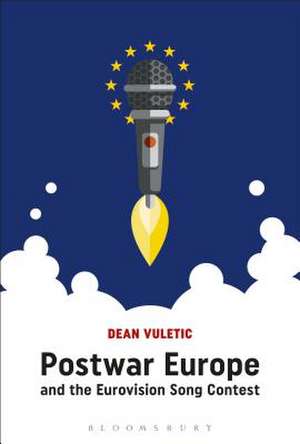Postwar Europe and the Eurovision Song Contest
Autor Dr Dean Vuleticen Limba Engleză Paperback – 24 iul 2019
| Toate formatele și edițiile | Preț | Express |
|---|---|---|
| Paperback (1) | 232.07 lei 6-8 săpt. | |
| Bloomsbury Publishing – 24 iul 2019 | 232.07 lei 6-8 săpt. | |
| Hardback (1) | 716.15 lei 6-8 săpt. | |
| Bloomsbury Publishing – 24 ian 2018 | 716.15 lei 6-8 săpt. |
Preț: 232.07 lei
Preț vechi: 297.75 lei
-22% Nou
Puncte Express: 348
Preț estimativ în valută:
44.41€ • 46.20$ • 36.66£
44.41€ • 46.20$ • 36.66£
Carte tipărită la comandă
Livrare economică 15-29 aprilie
Preluare comenzi: 021 569.72.76
Specificații
ISBN-13: 9781350107397
ISBN-10: 1350107395
Pagini: 288
Ilustrații: 7 bw illus
Dimensiuni: 156 x 234 x 20 mm
Greutate: 0.41 kg
Editura: Bloomsbury Publishing
Colecția Bloomsbury Academic
Locul publicării:London, United Kingdom
ISBN-10: 1350107395
Pagini: 288
Ilustrații: 7 bw illus
Dimensiuni: 156 x 234 x 20 mm
Greutate: 0.41 kg
Editura: Bloomsbury Publishing
Colecția Bloomsbury Academic
Locul publicării:London, United Kingdom
Caracteristici
Uses song lyrics, music, costumes and choreography, amongst other aspects of the Contest, to discuss big topics in recent European history, including the Cold War, communism, nationalism, European integration and human rights
Notă biografică
Dean Vuletic is a historian of contemporary Europe. As a Lise Meitner Fellow in the Department of East European History at the University of Vienna, he leads the project "Intervision: Popular Music and Politics in Eastern Europe". As a Marie Sklodowska-Curie Fellow, he previously led the project "Eurovision: A History of Europe through Popular Music". He holds a doctorate in history from Columbia University, USA. He regularly comments on the Eurovision Song Contest in the international media.
Cuprins
List of FiguresAcknowledgementsAbbreviationsIntroduction: Europe's Greatest Television ShowPart I: The Cold War, 1945-19891. The Western European Arrangement2. The Show of Nations3. A Contest for CommunismPart II: European Unification, 1990-20164. A Concert of Europe5. The Values of EurovisionConclusion: Bridges, Diamonds and FiresBibliographyIndex
Recenzii
Moves between the Eurovision stage to the political stage . Never has it been placed in its international context as in this truly inventive new book.
Vuletic goes beneath the bubblegum to reveal surprising machinations.
As a scholarly study in international cooperation and competition, this book is exemplary.
Dean Vuletic's book is an important intervention ... Comprehensive in its coverage, it will become a go-to book for any scholar who is interested in the song contest and its history.
It is the recognition of such value in song-no less in Eurovision song-that makes Dean Vuletic's rich history of the Eurovision Song Contest very important reading indeed.
Vuletic ascribes the Eurovision Song Contest an important role in the history of post-war Europe ... Comprehensive in its coverage, it will become a go-to book for any scholar who is interested in the song contest and its history.
The book presents a well-researched and exhaustive historical account of organisational and political matters in relation to the Eurovision Song contest, as well as an in-depth analysis of its cultural significance in a European perspective ... The book as a whole constitutes a significant and valuable contribution to the understanding the interplay of popular music, media and cultural policy in post-World War II Europe.
[A] survey of the ESC, and a well-researched one. Vuletic makes extensive use of archival materials of the Council of Europe, International Telecommunications Union, EBU and OIRT . [An] important and essential book.
A fascinating insight into the history of Eurovision. It is accessibly written, draws on a wealth of archival material, and adds much to our understanding of European culture in the postwar period.
This is a terrific addition to the literature on music and international relations. Analyzing the history of what has become the biggest forum of collective voting in Europe, Dean Vuletic shows the janus-headed nature of the Eurovision Song Contest - a competition both apolitical and political at the same time. A must-read addition for students of musicology, international relations and history, and, really, anyone trying to understand the confusing attraction of Europe's largest music show.
Overturning familiar assumptions about this "apolitical" celebration of pan-European values, Vuletic brings us a much-needed serious and thorough historical account of the Eurovision Song Contest from its founding in the mid-1950s to the present-day paradox of this "international event with national limitations". A crucial read for anyone interested in the song contest's deeper history and significance.
Vuletic goes beneath the bubblegum to reveal surprising machinations.
As a scholarly study in international cooperation and competition, this book is exemplary.
Dean Vuletic's book is an important intervention ... Comprehensive in its coverage, it will become a go-to book for any scholar who is interested in the song contest and its history.
It is the recognition of such value in song-no less in Eurovision song-that makes Dean Vuletic's rich history of the Eurovision Song Contest very important reading indeed.
Vuletic ascribes the Eurovision Song Contest an important role in the history of post-war Europe ... Comprehensive in its coverage, it will become a go-to book for any scholar who is interested in the song contest and its history.
The book presents a well-researched and exhaustive historical account of organisational and political matters in relation to the Eurovision Song contest, as well as an in-depth analysis of its cultural significance in a European perspective ... The book as a whole constitutes a significant and valuable contribution to the understanding the interplay of popular music, media and cultural policy in post-World War II Europe.
[A] survey of the ESC, and a well-researched one. Vuletic makes extensive use of archival materials of the Council of Europe, International Telecommunications Union, EBU and OIRT . [An] important and essential book.
A fascinating insight into the history of Eurovision. It is accessibly written, draws on a wealth of archival material, and adds much to our understanding of European culture in the postwar period.
This is a terrific addition to the literature on music and international relations. Analyzing the history of what has become the biggest forum of collective voting in Europe, Dean Vuletic shows the janus-headed nature of the Eurovision Song Contest - a competition both apolitical and political at the same time. A must-read addition for students of musicology, international relations and history, and, really, anyone trying to understand the confusing attraction of Europe's largest music show.
Overturning familiar assumptions about this "apolitical" celebration of pan-European values, Vuletic brings us a much-needed serious and thorough historical account of the Eurovision Song Contest from its founding in the mid-1950s to the present-day paradox of this "international event with national limitations". A crucial read for anyone interested in the song contest's deeper history and significance.




